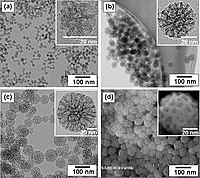
Photo from wikipedia
The rapid development of nanoscience and nanoengineering provides new perspectives on the composition of food materials, and has great potential for food biology research and applications. The use of nanoparticle… Click to show full abstract
The rapid development of nanoscience and nanoengineering provides new perspectives on the composition of food materials, and has great potential for food biology research and applications. The use of nanoparticle additives and the discovery of endogenous nanoparticles in food make it important to elucidate in vivo safety of nanomaterials. Nanoparticles will spontaneously adsorb proteins during transporting in blood and a protein corona can be formed on the nanoparticle surface inside the human body. Protein corona affects the physicochemical properties of nanoparticles and the structure and function of proteins, which in turn affects a series of biological reactions. This article reviewed basic information about protein corona of food-related nanoparticles, elucidated the influence of protein corona on nanoparticles properties and protein structure and function, and discussed the effect of protein corona on nanoparticles in vivo. The effects of protein corona on nanoparticles transport, cellular uptake, cytotoxicity, and immune response were reviewed, and the reasons for these effects were also discussed. Finally, future research perspectives for food protein corona were proposed. Protein corona gives food nanoparticles a new identity, which makes proteins bound to nanoparticles undergo structural transformations that affect their recognition by receptors in vivo. It can have positive or negative impacts on cellular uptake and toxicity of nanoparticles and even trigger immune responses. Understanding the effects of protein corona have potential in evaluating the fate of the food-related nanoparticles, providing physicochemical and biological information about the interaction between proteins and foodborne nanoparticles. The review article will help to evaluate the safety of protein coronas formed on nanoparticles in food, and may provide fundamental information for understanding and controlling nanotoxicity.
Journal Title: Comprehensive reviews in food science and food safety
Year Published: 2021
Link to full text (if available)
Share on Social Media: Sign Up to like & get
recommendations!